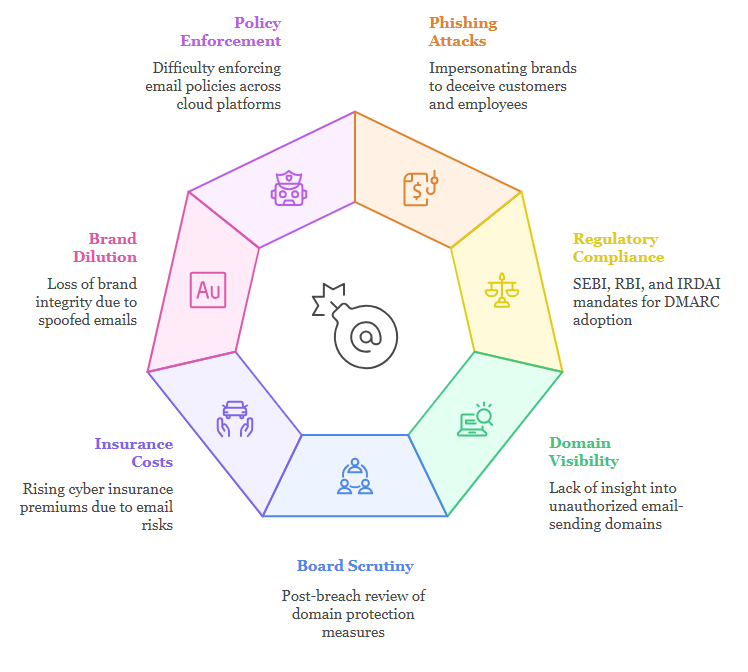DMARC & BIMI: Secure Your Brand. Protect Your Inbox. Command Trust.
Secure critical data, ensure compliance, and reduce breach impact — all without slowing down operations. CXOs trust AmbiSure for cloud-ready, regulation-compliant data protection.
Overview
Why Leading Enterprises Trust DMARC & BIMI
Email remains the top vector for targeted cyberattacks. Spoofing, phishing, and impersonation cost Indian enterprises billions in financial losses, regulatory penalties, and irreparable brand damage.
DMARC + BIMI empowers BFSI, Insurance, Pharma, and Manufacturing leaders to take back control of their email ecosystem while projecting visual trust to every recipient.
The Challenge: Unseen Vulnerabilities
Executive Challenges in Email Security
CISOs, CIOs, and CROs face complex pressures:

According to the Verizon DBIR 2024, over 94% of malware is delivered via email. The IBM Cost of Data Breach Report 2023 shows spoofed email attacks cost Indian firms an average of $2.1 million per breach.
FEATURES
What BYOK + BYOE from AmbiSure Offers
- Get 100% DMARC Alignment: Blocks spoofed emails from reaching inboxes.
- BIMI Support with Verified Logos: Boosts email trust and open rates by displaying your trademarked logo in recipient inboxes.
- DMARC Enforcement (p=reject/quarantine): Protects domains by eliminating unauthorized senders.
- Domain & Subdomain Monitoring: Tracks email usage across third-party and shadow IT systems.
- Real-Time Forensics Reports: Instantly detect misconfigurations or abuse attempts.
- API & SIEM Integrations: Plug into Splunk, QRadar, Azure Sentinel for centralized visibility.
- Role-Based Access & Audit Trails: Enforce governance and simplify compliance reporting.
- Automated Policy Recommendations: Suggest optimal policy settings for each domain.
- Scheduled Reporting to CXOs: Board-ready email security dashboards.
- Global Mailbox Provider Compatibility: Gmail, Yahoo, Outlook, Apple Mail, etc.
business benefits
JUSTIFICATION FOR ENTERPRISE CXOs:

Up to 99% reduction in spoofed emails within 90 days

40–70% higher email open rates with BIMI logos

Meets RBI/IRDAI/SEBI compliance requirements instantly

Reduces incident response costs by ₹1–3 Cr per breach event

Protects Board & CXO reputations from public breach backlash

Prevents customer churn from brand impersonation scams
Why Ambisure?
India’s leading cybersecurity integrator with DMARC implementation expertise


Local presence + CXO-level advisory ensures smooth audits and fast adoption
Authorized implementation partner for top DMARC/BIMI technology providers


Support & Regulatory Mapping for Indian Industry Verticals
WHAT OUR CLIENTS SAY
"AmbiSure implemented DMARC across all our brands — phishing complaints dropped overnight."
— IT Manager, Indian NBFC
"Our clinical trial outreach emails now display our certified logo. BIMI helped us rebuild digital trust after recent spoofing attack."
— CIO, Global Pharma Enterprise
frequently asked questions
What is DMARC and why does it matter to my Board?
- DMARC prevents attackers from sending emails using your domain. Boards expect brand and customer trust protection—DMARC enforces that.
How is BIMI different from a regular logo in an email?
- BIMI displays your official, Globally verified logo next to your email in the inbox—only if DMARC is enforced. It signals visual trust to recipients.
Do we need BIMI if we already use SPF/DKIM?
- SPF/DKIM are foundational. BIMI builds visible trust and improves engagement. It’s the brand marketing layer over your security foundation.
What does implementation involve?
- We audit your domains, configure SPF/DKIM/DMARC, submit for BIMI approval, and deploy across mail providers. Most projects close in 1–2 weeks.
Is this solution compliant with Indian regulations?
- Yes. We ensure DMARC compliance with SEBI, RBI, IRDAI, and DPDP mandates. You’ll have documentation ready for any audit.
Can it reduce cyber insurance premiums?
- Yes. Many insurers offer discounts if you enforce DMARC and reduce email-borne risks.
What are the ongoing maintenance needs?
- Minimal. We provide monitoring, alerting, and regular policy tuning. Quarterly CXO reports are included.
